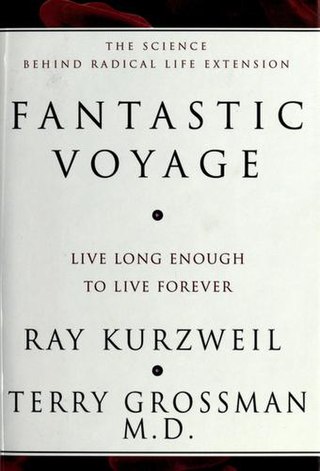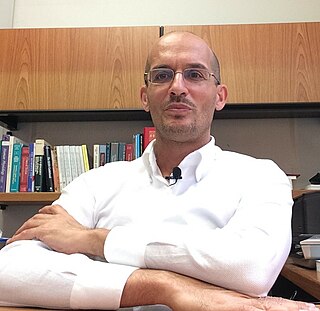Dieting is the practice of eating food in a regulated way to decrease, maintain, or increase body weight, or to prevent and treat diseases such as diabetes and obesity. As weight loss depends on calorie intake, different kinds of calorie-reduced diets, such as those emphasising particular macronutrients, have been shown to be no more effective than one another. As weight regain is common, diet success is best predicted by long-term adherence. Regardless, the outcome of a diet can vary widely depending on the individual.

Fasting is the act of refraining from eating, and sometimes drinking. However, from a purely physiological context, "fasting" may refer to the metabolic status of a person who has not eaten overnight, or to the metabolic state achieved after complete digestion and absorption of a meal. Metabolic changes in the fasting state begin after absorption of a meal.

Joel Fuhrman is an American celebrity doctor who advocates a plant-based diet termed the "nutritarian" diet which emphasizes nutrient-dense foods. His practice is based on his nutrition-based approach to obesity and chronic disease, as well as promoting his products and books. He has written books promoting his dietary approaches including the bestsellers Eat to Live, Super Immunity, The Eat to Live Cookbook, The End of Dieting (2016) and The End of Heart Disease (2016). He sells a related line of nutrition-related products.

A fad diet is a diet that is popular, generally only for a short time, similar to fads in fashion, without being a standard scientific dietary recommendation, and often making unreasonable claims for fast weight loss or health improvements; as such it is often considered a type of pseudoscientific diet. Fad diets are usually not supported by clinical research and their health recommendations are not peer-reviewed, thus they often make unsubstantiated statements about health and disease.

Low-carbohydrate diets restrict carbohydrate consumption relative to the average diet. Foods high in carbohydrates are limited, and replaced with foods containing a higher percentage of fat and protein, as well as low carbohydrate foods.

The Okinawa diet describes the traditional dietary practices of indigenous people of the Ryukyu Islands, which were claimed to have contributed to their relative longevity over a period of study in the 20th century.

In nutrition, diet is the sum of food consumed by a person or other organism. The word diet often implies the use of specific intake of nutrition for health or weight-management reasons. Although humans are omnivores, each culture and each person holds some food preferences or some food taboos. This may be due to personal tastes or ethical reasons. Individual dietary choices may be more or less healthy.
Calorie restriction is a dietary regimen that reduces the energy intake from foods and beverages without incurring malnutrition. The possible effect of calorie restriction on body weight management, longevity, and aging-associated diseases has been an active area of research.

Fantastic Voyage: Live Long Enough to Live Forever is a book authored by Ray Kurzweil and Terry Grossman published in 2004. The basic premise of the book is that if middle aged people can live long enough, until approximately 120 years, they will be able to live forever—as humanity overcomes all diseases and old age itself. This might also be considered a break-even scenario where developments made during a year increase life expectancy by more than one year. Biogerontologist Aubrey de Grey called this the "Longevity escape velocity" in a 2005 TED talk.

A healthy diet is a diet that maintains or improves overall health. A healthy diet provides the body with essential nutrition: fluid, macronutrients such as protein, micronutrients such as vitamins, and adequate fibre and food energy.

The China Study: The Most Comprehensive Study of Nutrition Ever Conducted and the Startling Implications for Diet, Weight Loss and Long-term Health is a book by T. Colin Campbell and his son, Thomas M. Campbell II. The book argues for health benefits of a whole food plant-based diet. It was first published in the United States in January 2005 and had sold over one million copies as of October 2013, making it one of America's best-selling books about nutrition.
The CRON-diet is a nutrient-rich, reduced calorie diet developed by Roy Walford, Lisa Walford, and Brian M. Delaney. The CRON-diet involves calorie restriction in the hope that the practice will improve health and retard aging, while still attempting to provide the recommended daily amounts of various nutrients. Other names include CR-diet, Longevity diet, and Anti-Aging Plan. The Walfords and Delaney, among others, founded the CR Society International to promote the CRON-diet.

Gary Taubes is an American journalist, writer, and low-carbohydrate / high-fat (LCHF) diet advocate. His central claim is that carbohydrates, especially sugar and high-fructose corn syrup, overstimulate the secretion of insulin, causing the body to store fat in fat cells and the liver, and that it is primarily a high level of dietary carbohydrate consumption that accounts for obesity and other metabolic syndrome conditions. He is the author of Nobel Dreams (1987); Bad Science: The Short Life and Weird Times of Cold Fusion (1993); Good Calories, Bad Calories (2007), titled The Diet Delusion (2008) in the UK and Australia; Why We Get Fat: And What to Do About It (2010); The Case Against Sugar (2016); and The Case for Keto: Rethinking Weight Control and the Science and Practice of Low-Carb/High-Fat Eating (2020). Taubes's work often goes against accepted scientific, governmental, and popular tenets such as that obesity is caused by eating too much and exercising too little and that excessive consumption of fat, especially saturated fat in animal products, leads to cardiovascular disease.
Intermittent fasting is any of various meal timing schedules that cycle between voluntary fasting and non-fasting over a given period. Methods of intermittent fasting include alternate-day fasting, periodic fasting, such as the 5:2 diet, and daily time-restricted eating.

Mark P. Mattson is an American neuroscientist who is an adjunct professor of neuroscience at the Johns Hopkins School of Medicine.
Valter D. Longo is an Italian-American biogerontologist and cell biologist known for his studies on the role of fasting and nutrient response genes on cellular protection aging and diseases and for proposing that longevity is regulated by similar genes and mechanisms in many eukaryotes. He is currently a professor at the USC Davis School of Gerontology with a joint appointment in the department of Biological Sciences as well as serving as the director of the USC Longevity Institute.
Chiara Tilesi is an Italian-American director, screenwriter, activist, and producer of the 2023 Academy Award-nominated movie "Tell It Like a Woman".

Luigi Fontana, M.D., PhD, FRACP is a physician scientist who studies healthy longevity, with a focus on calorie restriction, endurance exercise and metabolism. He is the Leonard P Ullmann Chair in Translational Metabolic Health at the Charles Perkins Centre, where he directs the Charles Perkins Centre Royal Prince Alfred Clinic and the CPC RPA Health for Life Research, Educational and Clinical Program. He is also a Professor of Medicine and Nutrition in the Faculty of Medicine and Health at the University of Sydney and a Clinical Academic in the Department of Endocrinology at the Royal Prince Alfred Hospital in Sydney, Australia. Fontana was a professor of medicine and co-Director of the Healthy Longevity Program at Washington University School of Medicine.
The relationship between diet and longevity encompasses diverse research studies involving both humans and animals, requiring an analysis of complex mechanisms underlying the potential relationship between various dietary practices, health, and longevity.












